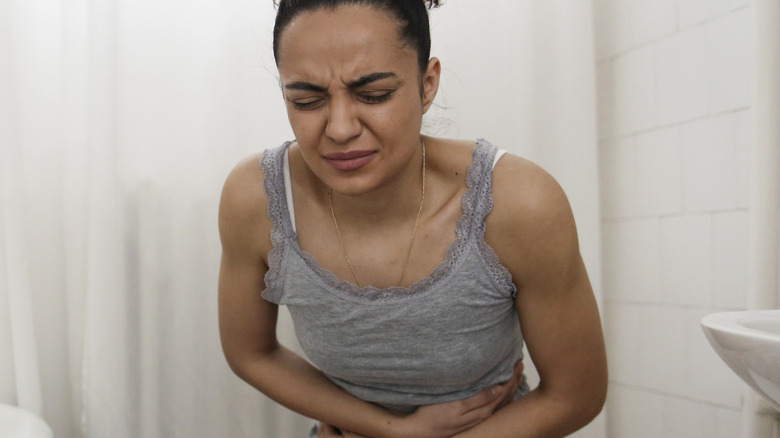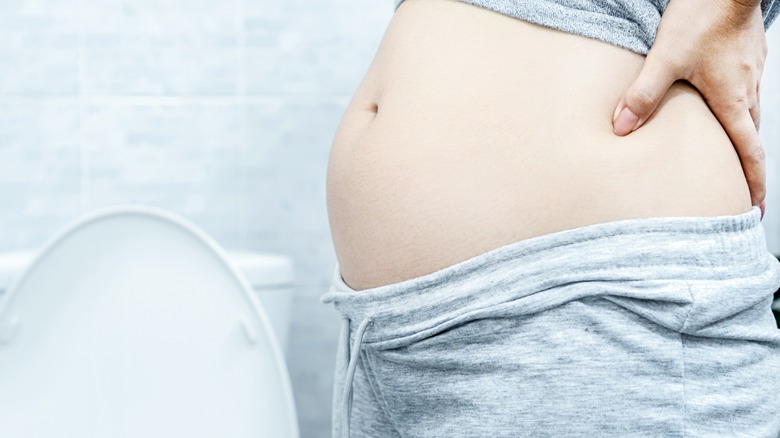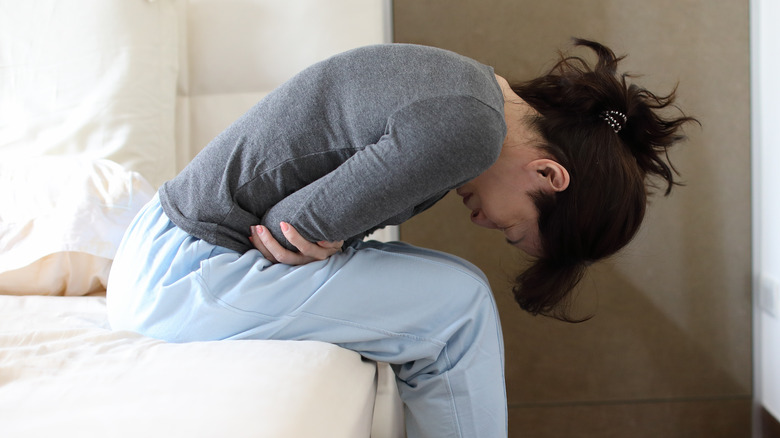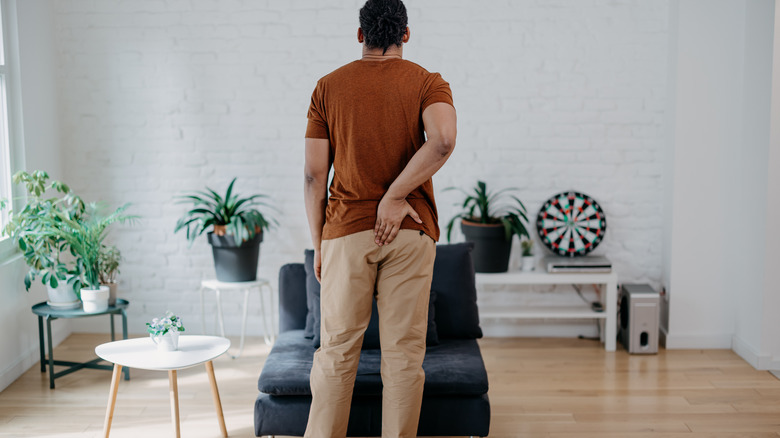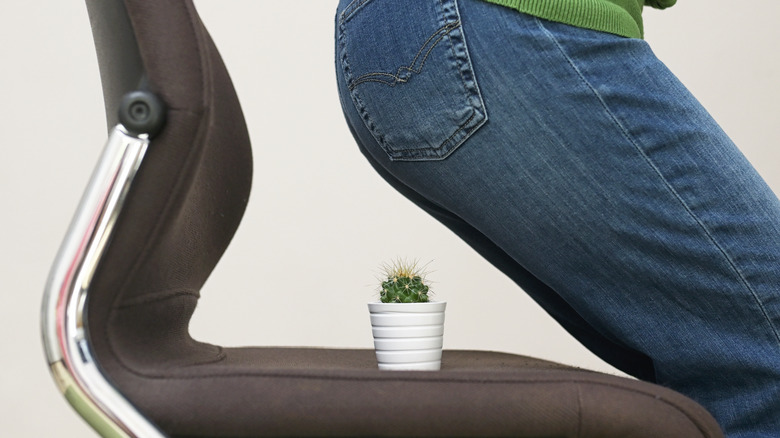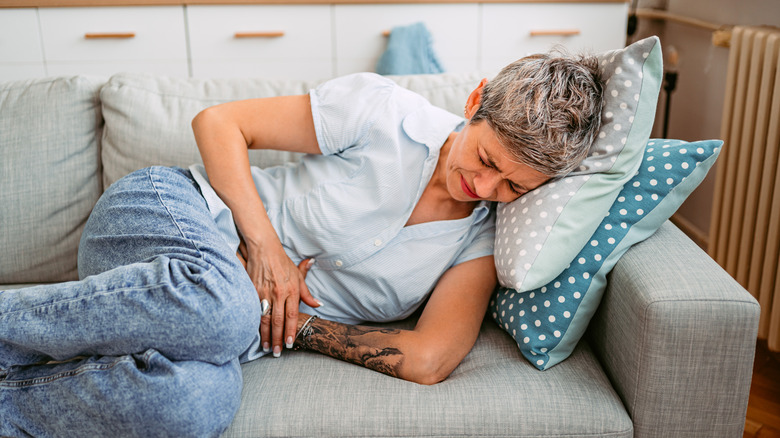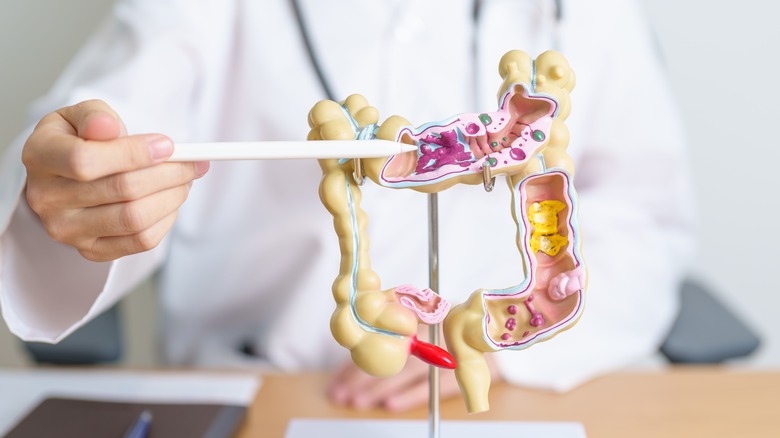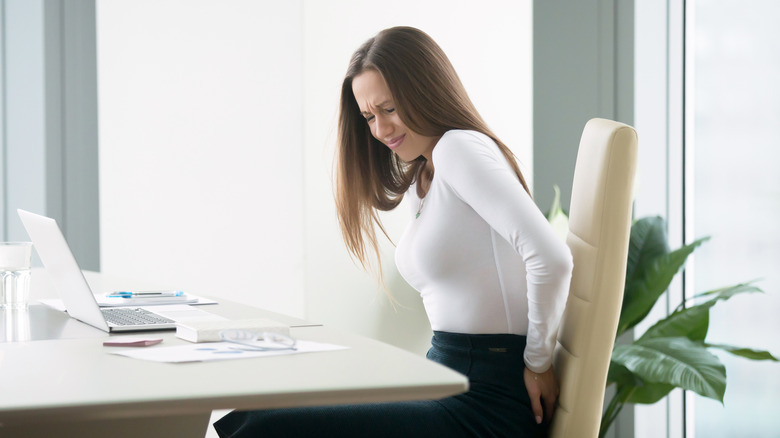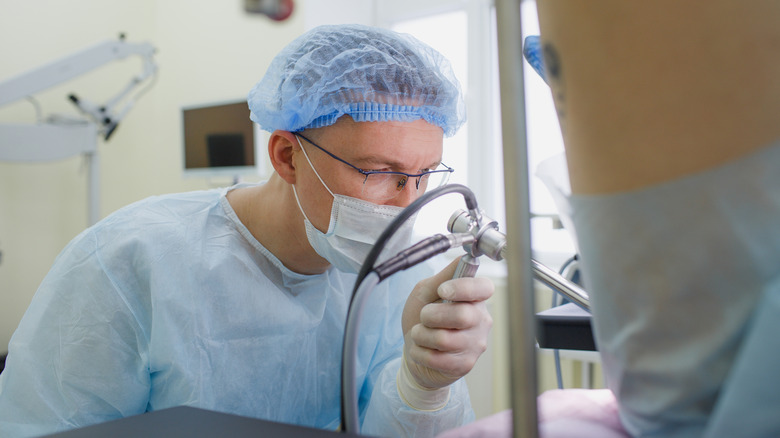What It Means When Your Poop Burns
You made a mad dash for the bathroom, and you felt a distinct burn that was not normal for you. Burning poop can happen: First, you'll want to look at the foods you've eaten in the last day or so. Spicy foods are notorious for being hot (going in and coming out). For example, food created with chilies will burn when it comes out of your body. A study published in the Journal of Nutritional Health and Food Science found that foods containing capsaicin, a common compound in chilies, create an anal burn. It also found that age mattered when it came to anal burns and eating spicy food.
However, spicy food isn't the only culprit behind burning bowel movements. Diet is a significant factor when it comes to burning poops, and they can happen when you consume foods with a lot of acid, too. For example, anusitis is caused by the consumption of acidic foods and leads to irritation of the skin surrounding the anus, per Digestive Health Clinic. Therefore, regulating these foods in your diet can help you feel relief. Several medical conditions can also come into play, like constipation, diarrhea, hemorrhoids, anal fissures, irritable bowel syndrome, inflammatory bowel syndrome, proctitis, sexually transmitted disease, and rectal cancer.
Learn the signs and symptoms of each possible reason behind that burning sensation when you poop, as well as the treatment options you can explore.
Constipation leads to irritation and burning
Constipation is a frequent gastrointestinal complaint that leads about 2.5 million people to the doctor every year in the U.S., according to the Cleveland Clinic. While you've probably heard of constipation before, this medical condition actually means you have fewer than three bowel movements a week. However, bowel movements are unique to each person. Therefore, someone who regularly poops several times a day may be constipated after only a few days without a movement. Meanwhile, others who go only a few times a week may take longer to become constipated.
Regardless of the time frame, constipation causes dry stools, pain when passing stools, feeling like it doesn't all come out, bloating, and cramping. The strain it takes to force the stool out can lead to tears in the skin and further irritate your gut. Since the stools are hard and dry, they can cause the skin to become inflamed as they pass (via Mayo Clinic).
Constipation is a common ailment with several different causes, like a lack of fiber in your diet, medication, irritable bowel syndrome, not drinking enough water, lack of exercise, and stress, per Johns Hopkins Medicine. Cleaning up your constipation requires looking at the cause and how to mitigate it. For example, dietary changes like getting enough water and fiber can help you go easier and relieve burning. Talk to your doctor about switching your medication, laxatives, and stool softeners.
Diarrhea is causing the burning
The stomach flu is no joke, and the need to go is something that you can't ignore. However, after dealing with frequent diarrhea, you might also develop a new symptom: a burning sensation when it's time to go.
According to the National Institute of Diabetes and Digestive and Kidney Diseases (NIDDK), diarrhea is the act of passing loose and watery stools three or more times a day. This condition comes with a frequent urge to go, cramping, loss of bowel control, and pain. It may come as no surprise that food and nutrients don't have time to be absorbed when you have diarrhea, so stomach acid, digestive enzymes, and bile can irritate intestinal tissues and the anus, creating burning poops (via Medical News Today).
The causes of diarrhea are vast, but stomach flu and food poisoning are common causes. You also experience diarrhea from food allergies, spicy foods, intestinal diseases, running, and cancer. When diarrhea happens for more than a few weeks, it might be considered chronic diarrhea, states Medline Plus.
Diarrhea can leave you sore, so a warm bath might help to soothe the irritation. Try to apply an ointment to your anus and skin to provide a barrier over your skin and prevent new irritation. Per WebMD, avoiding foods or drinks that worsen the condition can also be beneficial.
The burning sensation could be coming from hemorrhoids
Burning when you go number two could be swelling of the veins in the intestine and rectum, known as hemorrhoids. According to the American Society of Colon & Rectal Surgeons, hemorrhoids are enlarged blood vessels that bulge around the rectum and anus. These weakened vessels also bleed due to the stretching and pressure of the vessels. Hemorrhoids can be internal, affecting the lining beneath the anus. They can also be external, forming near the anus, and can be felt outside of the body.
As the stool passes through the body, it can irritate the hemorrhoids, causing a burning sensation. Other symptoms of hemorrhoids include itching and irritation, discomfort, swelling, and pain, states Medical News Today. These building veins have several causes like pregnancy, aging, heavy lifting, and genetics. For example, hemorrhoids tend to run in families. Straining that occurs during chronic constipation can also put pressure on the vessels, causing them to bulge.
While hemorrhoids can be alarming and painful, they typically heal on their own. To treat the pain and itching, try using warm baths and ointments to calm the area. Fill your diet with high-fiber foods and fluids to ensure you keep constipation at bay. Hemorrhoids that produce painful clots or don't go away on their own might require medical intervention, per Harvard Health Publishing.
Fiery poops might be attributed to an anal fissure
According to WebMD, anal fissures are tears or cuts in the delicate lining of your anus. Some tears can expose the sphincter muscle, which causes it to spasm. The contractions can make the anal fissures worse, leading to more burning in the area. Every time you have a bowel movement, it irritates the fissure, making it hard for it to heal.
Given that these are tears on the anus, they are felt if you touch the area. These painful tears cause burning that can last for hours, sharp pain when you use the bathroom, and bleeding. Therefore, small blood drips on the toilet paper when you wipe is common, per NHS. Anal fissures come from a variety of conditions, like diarrhea, constipation, wiping roughly, inflammatory bowel diseases, pregnancy, straining, and cancer (via Better Health Channel).
While anal fissures heal slowly, they can heal on their own without treatment. However, sitz baths can help alleviate their burning and pain. Medication and ointment are available for a chronic problem with anal fissures.
Burning is common for those with irritable bowel syndrome
Irritable bowel syndrome (IBS) is a group of symptoms, like changes in bowel movements, gas, cramps, burning, and bloating, without any visible signs of damage to the intestines or digestive tract, according to the NIDDK. IBS can cause repeat bouts of diarrhea or constipation. Some people with IBS also experience episodes of both.
While the cause of IBS can be hard to nail down, Cleveland Clinic experts say it could be due to a disruption of the communication between the brain and gut. This makes the muscles of the gut very sensitive, so the muscles can vary in how they contract, leading to changes in bowel movements and burning when using the bathroom. Women are reportedly twice as likely as men to develop IBS, and it can also run in families. Those with severe digestive tract infections and food intolerances are more likely to develop this condition. Food, emotional stress, and medication are triggers for bouts of IBS.
Once you've got a diagnosis of IBS in your medical chart, your healthcare professional can help you find different medications available. Sometimes, though, all you need are a few lifestyle changes to limit IBS flare-ups. For example, cutting foods out of your diet that cause symptoms (like gluten or fat) is beneficial. NIDDK also recommends probiotics and practicing healthy mental health.
Inflammatory bowel diseases cause burning bowel movements
Inflammation and burning go hand in hand, especially when you have inflammatory bowel disease (IBD). This condition is an umbrella term that covers chronic inflammation of the tissues of the intestines, like ulcerative colitis (UC) and Crohn's disease, according to the Mayo Clinic. While the cause of IBD isn't entirely known, a malfunction of the immune system is a suspected cause. The immune system typically attacks bacteria and viruses, but with an autoimmune disorder, it can attack the healthy tissues in your body, like the intestines.
UC and Crohn's disease are distinctive to specific digestive areas. For example, UC causes inflammation and ulcers in the large intestine. Crohn's disease can cause inflammation in any area of the digestive tract, from your mouth to the anus, per the Centers for Disease Control and Prevention (CDC). Moreover, Crohn's disease causes patches of damage, while UC is continuous. However, both diseases cause diarrhea, abdominal cramping and pain, bloody stool, and weight loss. The burning can come from skin inflammation and cramping pain.
Managing these diseases takes medication and dietary changes to control flare-ups. The Cleveland Clinic notes that about 30% of people with UC need surgery at some point.
Proctitis causes anal burning
When there aren't any lumps or tears but the burning is still there, it could be the rectal lining causing pain. Proctitis is inflammation of the lining of the tissue of the inner rectum. Symptoms include irritation, a need to poop, diarrhea, bleeding, and passing mucus, per Healthline. The inflammation of the lining leads to a burning feeling and pain with bowel movements. The NIDDK also notes that the condition can be chronic or acute, depending on the cause.
According to the Mayo Clinic, about 30% of those with inflammatory bowel disease deal with proctitis. However, this condition can be caused by sexually transmitted infections (STIs), trauma to the anus, foodborne illnesses, and radiation therapy for cancer treatments. In some instances, antibiotics can hinder the good bacteria in your gut, allowing harmful bacteria to grow and inflame the rectal lining.
Getting treatment is vital to calming the burning during your bowel movements. The National Organization for Rare Disorders notes that antibiotics can be used for proctitis from STIs and foodborne infections. Diet and medications help alleviate symptoms for people with IBD. Hospitalization might be needed for those with severe cases.
Consider if STIs might be to blame
You might not think of burning poop as a symptom of an STI, but it can be. Several conditions, like syphilis, herpes simplex, and gonorrhea, can lead to a burning sensation while pooping. Syphilis is a bacterial infection spread through sexual contact that leads to painless sores on the rectum and genitals, according to the Mayo Clinic. The sores can itch and burn with a bowel movement. The disease can be dangerous if not treated, since it can damage the brain, heart, and other organs.
According to the World Health Organization, about 13% of people have the herpes simplex virus type 2 infection, also known as genital herpes. This infection produces painful blisters and ulcers that can appear on the anus, according to Medical News Today. Persistent pain and a change in bowel habits are also symptoms. While the sores can be treated, herpes isn't a curable condition and can lead to flare-ups.
Gonorrhea can also cause painful bowel movements due to a rectal infection. Sufferers might have bleeding, soreness, and discharge. According to the CDC, about 1.6 million new gonorrhea infections occurred in 2018, and it's the second most STI in the U.S. Treatment for this disease includes a single dose of ceftriaxone to kill off the bacteria that cause the infection. However, treatment can't cure any damage the STI may have caused.
Burning with bowel movements could be a sign of rectal cancer
One of the more severe conditions attributed to burning defecation is rectal cancer. This disease is grouped with colon cancer as colorectal cancer, and it's caused by the overgrowth of malignant cells within the rectum and colon. However, it's typically a slow-developing cancer (via Memorial Sloan Kettering Cancer Center). Risk factors for rectal cancer include family history, inherited changes in specific genes, IBD, obesity, and smoking. It's also found more in those of Ashkenazi Jewish, African American, and Hispanic descent.
Many of the warning signs of rectal cancer can be attributed to other gastrointestinal disorders. For example, sufferers can experience a change in bowel habits, diarrhea, blood, narrow stools, and weight loss, states UCSF Health. The polyps that accompany some rectal cancers cause you to feel burning or pain when pooping. The National Cancer Institute noted many cancer sufferers also experience gas, bloating, cramps, and a change in appetite.
Rectal cancer must be diagnosed through tests and procedures like a colonoscopy, biopsy, and blood tests. Once it has been confirmed, the stage will be determined, depending on the size and spread of the cancer. Treatment includes surgery, chemotherapy, radiation, and targeted therapies.

